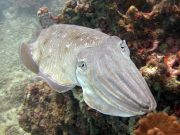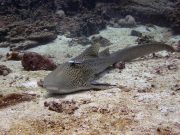Hin Bida Diving
Diving Hin Bida from Koh Lanta
Hin Bida (or Phi Phi Shark Point as it's also known) is a large submerged rocky outcrop around 8km south east of Koh Bida Nok and Koh Bida Nai, rising from the sandy bottom around 18m to break the surface at low tide.
Just 3 - 4 minutes by speedboat from the Bida Islands, this superb reef is a perfect place for both experienced and novice divers.
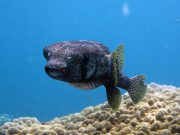
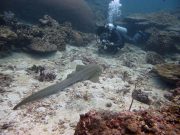
Hin Bida is covered in a huge variety of hard and soft corals, and though the pinnacle drops to 18 - 20 metres, the top is mostly between 3 - 8 metres deep, making it a great snorkelling spot at slack tide.
Hin Bida is also a great dive site for courses, including dives 3 & 4 of the open water course, the advanced course, and rescue dive course.
This beautiful pinnacle is less dived than many other sites which is evident in the quality of the corals and abundant marine life, however it is sensitive to currents and care should be taken here just after full and new moon periods.
Hin Bida Marine Life
Extensive Coral Pinnacle
Hin Bida is renowned for its rich marine biodiversity, making it a must-visit site for divers who want to experience the full spectrum of underwater life in the Andaman Sea.

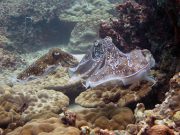
The site’s coral reefs are home to a wide variety of marine species, from colourful reef fish to larger pelagic species and fascinating macro life.
Find out more from the Thailand Department of National Parks on the Mu Koh Phi Phi Marine National Park.
Coral Reef
The pinnacle is covered in a mix of hard and soft corals, including brain corals, staghorn corals, and table corals, as well as vibrant whip corals, sea fans and sponges.
These coral formations provide essential habitat for a wide variety of marine life, offering shelter and feeding grounds for countless species.
The health of the corals at Hin Bida is generally very good, thanks to the site’s location within a protected marine park.
Reef Fish
Hin Bida is teeming with reef fish, and as you explore the pinnacle and the surrounding coral gardens, you’ll be surrounded by millions of colourful reef fish.
Species include butterflyfish, moorish idols, angelfish, parrotfish, damselfish, lionfish, moray eels, grouper, box fish, pufferfish and porcupine fish, all of which add to the site’s lively atmosphere.
These fish are often seen grazing on the corals or darting in and out of the crevices, making for a constantly changing and dynamic underwater scene. Underwater photographers will find no end of subjects here.
Schools of snappers, fusiliers, and barracudas are also constantly patrolling the reef, while smaller species like wrasse and blennies can be found among the corals.
Sharks and Rays
One of the highlights of diving at Hin Bida is the opportunity to see sharks up close. Divers may encounter leopard sharks at Hin Bida, particularly in the sandy areas surrounding the pinnacle.
These graceful creatures can be seen cruising the reef, or found resting on the sand, making them a popular subject for underwater photographers. Additionally, eagle rays are occasionally seen gliding past the reef, their large wings creating a striking silhouette against the blue water.
Turtles
Hin Bida is also a great place to encounter sea turtles. Hawksbill turtles, in particular, are often seen grazing on bubble corals that grow around the pinnacle.
These turtles are relatively accustomed to divers, and it’s not uncommon to have a close encounter with one as it swims by or feeds on the reef. Watching a turtle gracefully glide through the water or munch on corals is a highlight of any dive at Hin Bida.
Macro Life
For those interested in macro photography or observing smaller marine creatures, Hin Bida offers plenty of opportunities to spot fascinating critters.
The sandy patches and coral crevices are home to a variety of nudibranchs, shrimps, crabs, and other invertebrates.
These tiny creatures often go unnoticed by less experienced divers, but those with a keen eye will be rewarded with sightings of some of the ocean’s most intricate and colourful inhabitants.
Exploring Hin Bida
Diving Hin Bida from Koh Lanta
The main feature of diving at Hin Bida is exploring the submerged pinnacle and three coral fingers that dominate the underwater landscape.


The pinnacle’s structure, combined with its coral-covered surface, creates a dynamic environment that is both visually stunning and ecologically rich.
Hin Bida: The Pinnacle
A typical dive at Hin Bida begins with a descent along the pinnacle, where divers can explore the coral-covered walls and the numerous cracks and crevices that provide hiding spots for marine life.
The dive can be done as a multi-level dive, starting at the deeper sections of the pinnacle and gradually ascending to the shallower areas as the dive progresses.
The pinnacle is home to a huge variety of reef fish, and divers can expect to see snapper, fusiliers, and angelfish swirling around the coral formations.
The pinnacle’s relatively steep slopes and numerous overhangs provide shelter for larger species like groupers and moray eels, which can often be seen lurking in the shadows.
Hin Bida: Coral Gardens
As you explore the pinnacle, you’ll come across large areas of lush coral gardens that are teeming with life. including sweetlips, grinning lizardfish, and cornetfish.
These gardens are home to a wide range of hard and soft corals, sponges, and sea fans, which attract numerous species of reef fish and invertebrates, such as cuttlefish and squid.
The vibrant colours and intricate structures of the corals make this part of the dive particularly interesting.
Divers can spend time slowly exploring these extensive coral gardens, observing the interactions between the different species that call this reef home.
Hin Bida: The Fingers & Sandy Patches
Several coral encrusted fingers spread from the pinnacle to the south and west, creating a series of ridges and plateaus, interspersed with sandy flats and slopes.
These sandy areas are where you’re likely to encounter bottom-dwelling species such as smashing mantis shrimp, stingrays, and leopard sharks, which are frequent visitors to Hin Bida.
The sandy patches are also home to various species of macro life, including nudibranchs and crabs, making them a great spot for photographers looking to capture close-up shots of these fascinating creatures.
Keep an eye on the sandy flats spreading out from the reef, occasionally we can spot large eagle rays sitting in the sand, or cruising past.
Hin Bida: Dive Site Guide
- NameHin Bida
- Visibility10m - 25m +
- Level of DivingAll Levels
- SnorkelingSometimes
- Depth1m - 20m +
- CurrentsMild to Medium
- Journey Time25 - 30 mins
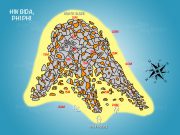
Book online to save 10% on dive trips and scuba courses on Koh Lanta.
Hin Bida Diving Price
Koh Lanta Dive Trips
Fun Diving price at Hin Bida is ฿3,150 for 2 dives. Diving price includes dive guide, free equipment rental, lunch & soft drinks on the boat when booked online in advance.
- 2 Dives
- FREE Equipment Rental
- Dive Guide
- Lunch & Soft Drinks
- 2 Dives
- FREE Equipment Rental
- Dive Guide
- Lunch & Soft Drinks
- You must be certified minimum SSI/PADI Open Water Diver, CMAS 1 Star Diver, BSAC Ocean Diver, or equivalent.
- Does not include Marine Park Diving Fee: Thai ฿240, Foreigner ฿600, per day.
See a complete list of all our Koh Lanta Diving Prices.
Book online to save 10% on dive trips and scuba courses on Koh Lanta.
Coral Reef Conservation
Protecting marine life at Hin Bida
Hin Bida is part of the Hat Noppharat Thara-Mu Ko Phi Phi National Park, a marine protected area. This status helps preserve the underwater ecosystem at Hin Bida, and ensures sustainable tourism practices.
Divers visiting Hin Bida are encouraged to follow guidelines that minimise their impact on the environment.
Responsible Diving Practices
To protect the delicate marine environment, divers are urged to follow responsible diving practices, including:
- Avoid touching or disturbing marine life while diving at Hin Bida: Many marine organisms are delicate and can be harmed by human contact.
- Practice good buoyancy control while diving at Hin Bida: Maintaining proper buoyancy helps prevent accidental damage to corals and other marine life.
- Do not collect souvenirs from Hin Bida: Removing shells, corals, or other marine life from the sea is illegal and harmful to the ecosystem.
- Dispose of waste properly: Do not throw any rubbish or food into the sea, especially at the dive site. Throwing food into the water at a coral reef interferes with the delicate marine eco-system.
- Use Reef Safe Sun Block: Ensure your sunscreen is Reef Safe and does not harm the corals and marine life at Hin Bida.
Koh Lanta Dive Sites
Some of Thailand's Best Diving
Hin Bida is one of the best dive sites in Thailand, and can be easily dived from Koh Lanta by speedboat along with many of Thailand's other top dive sites:
- Lanta Marine Park
- Koh Haa Islands
- Koh Rok Islands
- Hin Daeng & Hin Muang
- Hin Musang Wildlife Reserve
- Shark Point & Anemone Reef
- Phi Phi Marine Park
- Bida Nok & Bida Nai
- Hin Bida
- Koh Phi Phi
- HTMS Kledkaeo Wreck
- Hin Klai
Find out more at the Thai Department of National Parks.
Our Dive Trip Schedule
Lanta Dive trips from 15 Oct - 15 May
Our dive trips depart Koh Lanta in the morning every day during high season from the south end of Long Beach, normally returning around 1:30 - 2pm.
| Week Day | Boat 1 | Boat 2 |
| Monday | Koh Bida / Phi Phi | Koh Bida / Phi Phi |
| Tuesday | Koh Haa Islands | Hin Daeng & Hin Muang |
| Wednesday | Koh Bida / Phi Phi | Koh Bida / Phi Phi |
| Thursday | Koh Haa Islands | Koh Haa Islands |
| Friday | Koh Haa Islands | Hin Daeng & Hin Muang |
| Saturday | Koh Bida / Phi Phi | Koh Bida / Phi Phi |
| Sunday | Koh Haa Islands | Koh Haa Islands |
- All trips are 2 dives a day
- Trips depart from the beach at our dive shop @ Lanta Castaway Beach Resort
- Trips Depart 8/9am, return 2pm
- Dive & Relax is open from Oct 15 - May 15.
- E-mail us info@diveandrelax.com in advance with any questions, or to make a booking.
We may schedule a Shark Point & Anemone Reef dive trip or a KledKaeo Wreck & Hin Klai dive trip upon request. A minimum of 5 divers are required for these trips, please let us know if you are interested.
We love to dive as much as possible during the high season, however all our dive trips depend on the weather, sea conditions, currents and minimum numbers and may be subject to change at short notice.
For more information on our weather and climate, check out the best time to visit Koh Lanta.
Book online to save 10% on dive trips and scuba courses on Koh Lanta.

